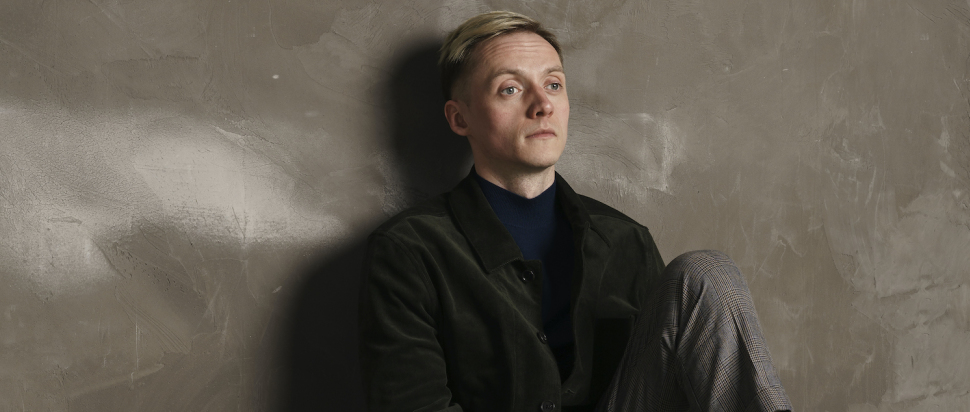Hamish Hawk on the abstract imagery of Heavy Elevator
As he prepares to release his boundary-pushing new record, Hamish Hawk discusses performativity, esoteric lyrics and the journey of songwriting
A storyteller, subverting common misconceptions of pop; an architect, constantly polishing and redeveloping; music as an act of creation that can have no end. Hamish Hawk’s Heavy Elevator is comprised of a series of wittily dark character portraits that find themselves fleshed out in dramatic chamber pop fashion, elucidated by seemingly incoherent imagery and lyrical phrasing. Accompanying them, so far, are three equally dark and wittily performed videos, existing, if anything, to amplify this universe that is Hawk’s Heavy Elevator. In one, Hawk appears as a jester, channelling the fool from King Lear, in another he's playing badminton in Leith Theatre. What both set up, though, is that with this record, things are getting serious.
For Hawk, though, this outward performativity lends itself to a better sense of authenticity when it comes to translating this record, which stands as something much darker, more mature, than any previous projects. “It feels more real to me,” he says. “But in order to communicate that, you need to push yourself away a bit, and almost say to an audience ‘I’m not going to do much talking to you, and it might look like I’m in my own world, but it’s because I’m concentrating on communicating it to you in the appropriate way.’ So out of a desire to be authentic, it almost looks like more of a performance, where what I was doing before, to me, was way more of a performance.” Retaining this authenticity to his music, and by virtue of that, himself, Hawk’s communication and performance of Heavy Elevator stands to depart from anything he has done before.
This sense of change seeps further through the record, using pop music as a skeleton from which to structure a body of work that is darker and more aggressive, yet more fully-formed, and ultimately, enjoyable to hear. Take Caterpillar and its new-wave danceability, and consider the troubled voice that runs through it: ‘Kill me, kill me, kill me / Killer offer me relief’. “Caterpillar was the kind of song that I thought: my mum isn’t going to like this,” he says. Which does present a struggle, or conflict with this way of performing. If pop structures act as a vehicle through which you can bear yourself, you can emit darkness and dance away with it, how do you avoid taking things too far?
The answer would be Hawk’s esoteric lyrical vignettes. “I think really, if people are anything like me, they’re crying out for stuff that is something they don’t quite get. Something you don’t understand can be really exciting; it's the way to move forward,” he explains. “I love the idea of lyrics that are original thoughts. And what I’m trying to do with my music is have as many of those original thoughts as possible.” The result of this is a record with a plenitude to unpack. An example being The Mauritian Badminton Doubles Champion, 1973, which opens with lines that are easy to find yourself hung-up on, in their simultaneous complex simplicity: ‘To write a cathedral, I’ll need a ball-point pen / It’ll sound like Common People sung by Christopher Wren.’
With images so abstract, and a use of language forms deliberately unusual, it becomes surprising that Heavy Elevator is, within this, underwritten by personal encounters and experiences. Understanding how these abstractions relate offers up, perhaps, the record’s most personal revelation of all; a window into the workings of his mind, and a seat within the intricate connections of his life. “The journey of writing a song, to me, is taking myself to a place in my head. That could be a city, or the corner of a particular room, or a real place where I sat in a chair at one point,” he explains. “I like to do that, and position myself in one space, and then try and work out what that space is metaphorically speaking, what it is I'm trying to get out of that.
“And then I put other things in it; I populate it with people, famous figures, particular records, novels, whatever it might be, and see how they interact with one another,” he continues. “I like that communion of imagery – it’s the thing that makes my songwriting ‘weird’ to some people, but it's all part of my life.
“You know, sometimes you will be in Scotmid listening to Édith Piaf, and you never really thought about how that music interacts with buying a loaf of bread. And I am fascinated by that sort of thing – I’m carrying around all of these relationships with these sorts of things, and occasionally one of these things will come into my head when I’m in some other place, and I have to think – what does that say about that?”
Heavy Elevator is released on 17 Sep via Assai Recordings
Hamish Hawk plays Hidden Door Festival, Edinburgh, 15 Sep
